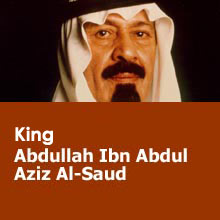Like King Fahd, King Abdullah is a son of the Saud family patriarch Ibn Saud. However, Abdullah is only a half brother of Fahd, and thus not one of the powerful “Sudairi Seven” brothers. After King Fahd suffered a debilitating stroke in 1995, Abdullah, then crown prince, effectively assumed sovereign power. Since then he has been recognized as Saudi Arabia’s de facto leader and has garnered the support of many Saudis. Abdullah officially became king after Fahd’s death in August, 2005.
Since taking over the responsibilities of the king, the low-profile Prince Abdullah has been portrayed as an honest, traditional man seeking to reestablish the legitimacy of the Saud family in the wake of growing public discontent. In reaction to high unemployment levels, falling living standards, and a rapidly changing social landscape, many Saudis are demanding significant social and political reforms. In response to pressures from both progressive and conservative factions within Saudi society, Abdullah introduced some controversial policies such as allowing minority Shi’ite Muslims to participate in the political process and holding the country’s first elections in early 2005. To strengthen the kingdom’s economic base, Crown Prince Abdullah also stepped up implementation of the government’s “Saudization” program, which aims to decrease the high percentage of expatriates in Saudi Arabia’s workforce by employing Saudi citizens in seventy percent of all jobs by the end of the decade.
Though reportedly a friend of the Bush family, King Abdullah has in the past been critical of U.S. political positions and his government cautious in its dealings with the United States.



